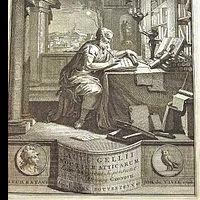Gellius VI: Ius Iurandum, Libri Incensi, Alexander
VI.18. De observata custoditaque apud Romanos iurisiurandi sanctimonia; atque inibi de decem captivis, quos Romam Hannibal deiurio ab his accepto legavit. 1 Iusiurandum apud Romanos inviolate sancteque habitum servatumque est. Id et moribus legibusque multis ostenditur, et hoc, quod dicemus, ei rei non tenue argumentum esse potest. 2 Post proelium Cannense Hannibal, Carthaginiensium imperator, ex captivis nostris electos decem Romam misit mandavitque eis pactusque est, ut, si populo Romano videretur, permutatio fieret captivorum et pro his, quos alteri plures acciperent, darent argenti pondo libram et selibram. 3 Hoc, priusquam proficiscerentur, iusiurandum eos adegit redituros esse in castra Poenica, si Romani captivos non permutarent. 4 Veniunt Romam decem captivi. 5 Mandatum Poeni imperatoris in senatu exponunt. 6 Permutatio senatui non placita. 7 Parentes cognati adfinesque captivorum amplexi eos postliminio in patriam redisse dicebant statumque eorum integrum incolumemque esse ac, ne ad hostes redire vellent, orabant. 8 Tum octo ex his postliminium iustum non esse sibi responderunt, quoniam deiurio vincti forent, statimque, uti iurati erant, ad Hannibalem profecti sunt. 9 Duo reliqui Romae manserunt solutosque esse se ac liberatos religione dicebant, quoniam, cum egressi castra hostium fuissent, commenticio consilio regressi eodem, tamquam si ob aliquam fortuitam causam, issent atque ita iureiurando satisfacto rursum iniurati abissent. 10 Haec eorum fraudulenta calliditas tam esse turpis existimata est, ut contempti vulgo discerptique sint censoresque eos postea omnium notarum et damnis et ignominiis adfecerint, quoniam, quod facturos deieraverant, non fecissent. 11 Cornelius autem Nepos in libro exemplorum quinto id quoque litteris mandavit multis in senatu placuisse, ut hi, qui redire nollent, datis custodibus ad Hannibalem deducerentur, sed eam sententiam numero plurium, quibus id non videretur, superatam; eos tamen, qui ad Hannibalem non redissent, usque adeo intestabiles invisosque fuisse, ut taedium vitae ceperint necemque sibi consciverint.
VII.17. Quis omnium primus libros publice praebuerit legendos; quantusque numerus fuerit Athenis ante clades Persicas librorum in bibliothecis publicorum.1 Libros Athenis disciplinarum liberalium publice ad legendum praebendos primus posuisse dicitur Pisistratus tyrannus. Deinceps studiosius accuratiusque ipsi Athenienses auxerunt; sed omnem illam postea librorum copiam Xerxes Athenarum potitus urbe ipsa praeter arcem incensa abstulit asportavitque in Persas. 2 Eos porro libros universos multis post tempestatibus Seleucus rex, qui Nicanor appellatus est, referendos Athenas curavit. 3 Ingens postea numerus librorum in Aegypto ab Ptolemaeis regibus vel conquisitus vel confectus est ad milia ferme voluminum septingenta; sed ea omnia bello priore Alexandrino, dum diripitur ea civitas, non sponte neque opera consulta, sed a militibus forte auxiliaris incensa sunt.
IX.3. Epistula Philippi regis ad Aristotelem philosophum super Alexandro recens nato. I. Philippus, Amyntae filius, terrae Macedoniae rex, cuius virtute industriaque Macetae locupletissimo imperio aucti gentium nationumque multarum potiri coeperant et cuius vim atque arma toti Graeciae cavenda metuendaque inclitae illae Demosthenis orationes contionesque vocificant, II. is Philippus, cum in omni fere tempore negotiis belli victoriisque adfectus exercitusque esset, a liberali tamen Musa et a studiis humanitatis numquam afuit, quin lepide comiterque pleraque et faceret et diceret. III. Feruntur adeo libri epistularum eius munditiae et venustatis et prudentiae plenarum, velut sunt illae litterae, quibus Aristoteli philosopho natum esse sibi Alexandrum nuntiavit. IV. Ea epistula, quoniam curae diligentiaeque in liberorum disciplinas hortamentum est, exscribenda visa est ad commonendos parentum animos. V. Exponenda est igitur ad hanc ferme sententiam: "Philippus Aristoteli salutem dicit. Filium mihi genitum scito. Quod equidem dis habeo gratiam, non proinde quia natus est, quam pro eo, quod eum nasci contigit temporibus vitae tuae. Spero enim fore, ut eductus eruditusque a te dignus exsistat et nobis et rerum istarum susceptione." VI. Ipsius autem Philippi verba haec sunt: Philippos Aristotelei chairein. Isthi moi gegonota hyion. Pollen oun tois theois echo charin, ouch houtos epi tei genesei tou paidos, hos epi toi kata ten sen helikian auton gegonenai; elpizo gar auton hypo sou traphenta kai paideuthenta axion esesthai kai hemon kai tes ton pragmaton diadoches.

